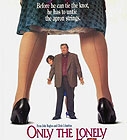|
|
|
|
Only
the Lonely
|
 |
|
One of the conditions that appear to heavily afflict mainstream film reviewers is amnesia. Many critics give the impression of existing in an eternal, press-release-driven present moment, hooked into current releases without much of a clue as to cinema's past. This is a real mistake, because even the least self-conscious pop film tends to be an intricate reworking of elements from both old, classic genres and currently successful trends. Trying to appreciate films in this manner is not just a matter of spotting the inevitable allusions to Hitchcock or Capra but, rather, trying to work out what exactly a film is drawing on and playing with, what kind of move it might be making in relation to its predecessors. Here, I would like to briefly suggest a non-amnesiac approach to the curious Only the Lonely. The poster for this film screams "the man – the woman – the mother!", and it shows John Candy and Ally Sheedy cowering and huddling together between the legs of the mother in question. It's a great poster, but it raises an expectation not exactly fulfilled by the movie itself. True, the central premise of the story is the plight of thirty-eight year old Danny (Candy) as he struggles to break free of the psychological-emotional hold of his very Irish, widowed mother, Rose (Maureen O'Hara). The early '90s boasted some extraordinary mommy-phobic films but Only the Lonely doesn't really join their company. That may, in fact, be its biggest problem. It tries to be gentle and melancholic – a modern reworking of some particular romantic comedies of the '30s and '40s by directors such as George Stevens and Leo McCarey. I don't mean the classics about frisky, warring heterosexual couples (like It Happened One Night [1934] or His Girl Friday [1940]) which get remade distantly today as Green Card (1990) or The Sure Thing (1985). I am thinking of the quieter films of the genre, dealing (for example) with the problems of older, sometimes painfully older folk trying to figure out whether they really want love back in their lives. With its uncertain, fumbling, lonely-hearts love story between an unglamorous cop and a mortician (Sheedy), Only the Lonely recalls some of the unfairly forgotten romantic comedies of the '70s like Alan J. Pakula's Love and Pain and the Whole Damn Thing (1973) and especially Billy Wilder's very moving Avanti! (1972). There is, however, a difference between making a gentle film and a bland one – something which the makers of Only the Lonely do not seem to have quite realised. This is surprising, since producer John Hughes and writer-director Chris Columbus have, between then, been involved in some of the sharpest and smartest American film entertainments of the '80s. But everything is soft-edged and washed-out here: Danny's life as a cop on the streets of Chicago; the potentially interesting racial-cultural conflict between Irish-Americans and Italian-Polish-Americans; the ultimate showdowns between the members of the infernal man-woman-mother triangle. Although, in the best Hughes style, there are a few vivid flashes of a genre-fed free association – Danny conjuring up death scenarios for his dear old mother, a psycho killer on Halloween, an exploding petrol truck – these moments do not halt the film's steady decline into the worst kind of formulaic, feel-good sentimentality. MORE Columbus: Bicentennial Man, Harry Potter and the Chamber of Secrets, Mrs Doubtfire, Nine Months, Stepmom © Adrian Martin August 1991 |
![]()